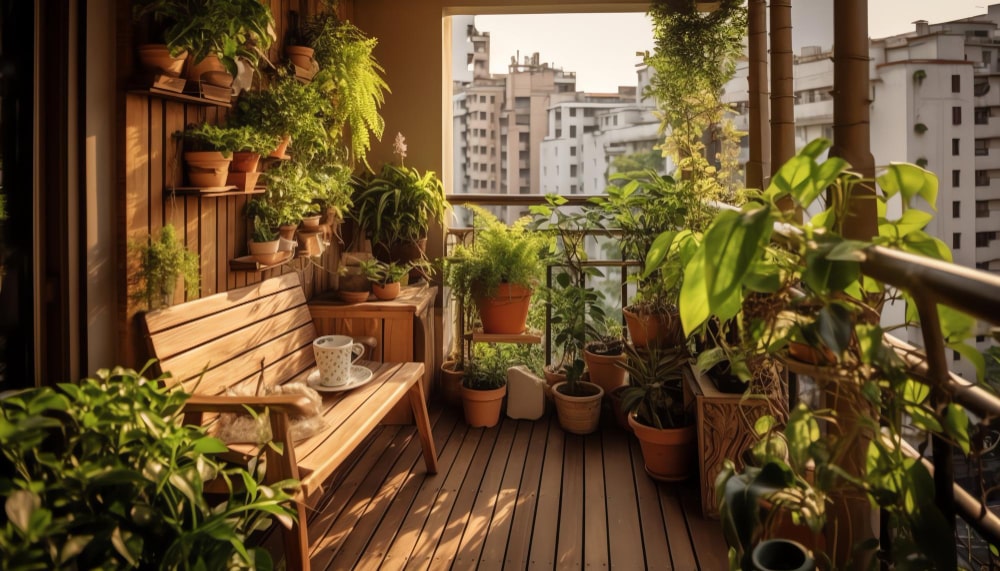In the hustle and bustle of modern life, finding moments of tranquility and connection with nature is essential for our well-being. Balconies and gardens serve as oases of calm where we can escape the stresses of daily life and immerse ourselves in the beauty of the outdoors. In the ancient Indian architectural philosophy of Vaastu Shastra, the design and layout of outdoor spaces hold significant importance, as they directly influence our connection with nature and overall harmony. By incorporating Vaastu principles into balcony and garden design, one can create outdoor sanctuaries that nurture the body, mind, and spirit. In this blog, we’ll explore Vaastu tips for designing balconies and gardens that foster a deep connection with nature.
Importance of Balcony and Garden Design in Vaastu Shastra
In Vaastu Shastra, outdoor spaces such as balconies and gardens are considered extensions of the home and are believed to play a vital role in balancing energy and promoting well-being. Balconies and gardens offer opportunities for relaxation, contemplation, and rejuvenation, allowing us to reconnect with the natural world and find solace amidst urban landscapes. By aligning with Vaastu principles, one can create outdoor environments that inspire harmony, vitality, and spiritual growth.
Vaastu Tips for Balcony and Garden Design
- Location and Orientation:
- Choose a location for the balcony or garden that receives ample sunlight and ventilation, preferably in the North, East, or Northeast direction to harness the positive energies of the Sun.
- Position seating areas or meditation spots in the North or East direction to benefit from the morning sun and promote a sense of vitality and well-being.
- Natural Elements:
- Incorporate elements of nature such as plants, flowers, trees, and water features into balcony and garden design to create a sense of harmony and balance.
- Use indigenous plants and seasonal flowers that thrive in local climate conditions to ensure easy maintenance and sustainability.
- Colors and Materials:
- Choose calming and soothing colors for outdoor furniture, planters, and décor elements, such as shades of green, blue, and earthy tones. These colors evoke a sense of tranquility and connection with nature.
- Use natural materials such as wood, stone, bamboo, and clay for flooring, decking, and accents to create a harmonious and eco-friendly outdoor environment.
- Seating and Relaxation Zones:
- Create comfortable seating areas or relaxation zones in the balcony or garden where occupants can unwind, meditate, or enjoy the beauty of nature.
- Position seating arrangements facing East or North to benefit from the morning sun and promote a sense of freshness and vitality.
- Flow of Energy:
- Ensure that pathways and walkways within the balcony or garden are clear and unobstructed to facilitate the smooth flow of energy.
- Avoid cluttering outdoor spaces with unnecessary furniture or décor items, and maintain open spaces to allow energy to circulate freely.
Elemental Balance
- Earth: Use natural materials such as stone, clay pots, and wooden planters to represent the Earth element.
- Water: Incorporate water features such as fountains, ponds, or birdbaths to activate the Water element and promote tranquility.
- Fire: Use candles, lanterns, or fire pits to evoke the Fire element and create a cozy ambiance during evenings.
- Air: Ensure adequate ventilation and airflow within the balcony or garden to honor the Air element and promote freshness.
- Space: Maintain open spaces and avoid overcrowding to honor the Space element and create a sense of expansiveness and freedom.
Conclusion
Incorporating Vaastu principles into balcony and garden design allows us to create outdoor spaces that serve as sanctuaries of peace, beauty, and connection with nature. By aligning with Vaastu guidelines related to location, orientation, natural elements, colors, and elemental balance, one can transform balconies and gardens into harmonious environments that nurture the body, mind, and spirit. Whether you’re designing a small balcony or a sprawling garden, embracing Vaastu principles can help you create outdoor sanctuaries where you can find solace, inspiration, and renewal amidst the beauty of the natural world.





 No products in the cart.
No products in the cart.